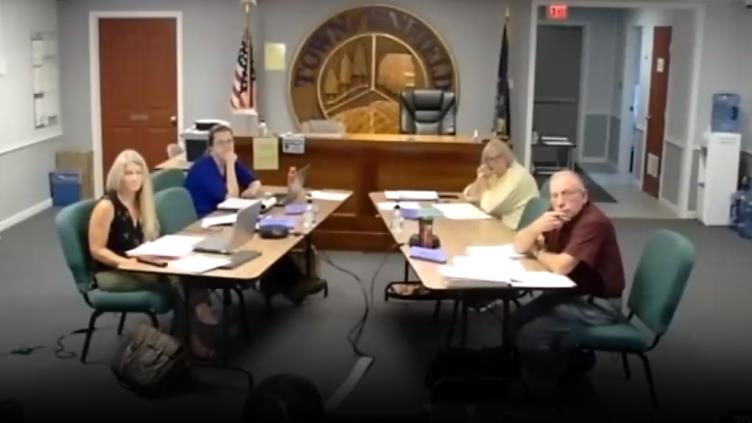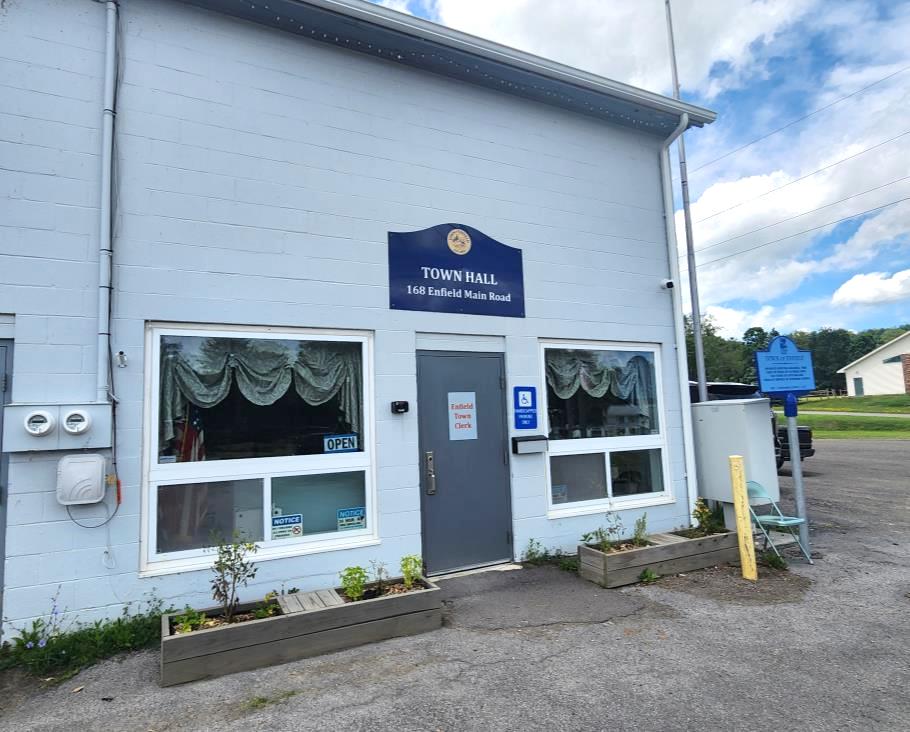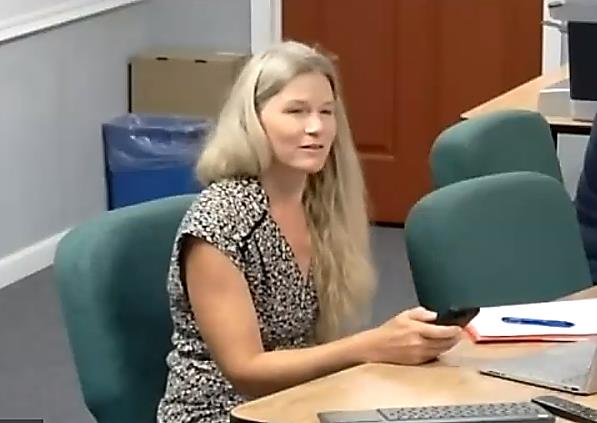Enfield Terms-of-Office laws head to November Referendum
Commentary by Councilperson Robert Lynch; posted July 31, 2024
Enfield Democracy matters. Your vote matters. When you, Enfield’s voters, speak, I, your elected Councilperson, attempt to listen. I’m equally obligated to recognize and respect your preference. It’s regrettable to me that some of those I sit beside in Town Government do not share my commitment.

On Wednesday, July 31, our Town Board voted to resubmit to you, Enfield’s electorate, for this, the second time in little more than three years, a trio of Local Laws that will determine how frequently several of our elected public servants must earn your approval to remain in office. Each local law will appear on the November ballot. That’s even though you, the voters, probably would prefer to have let settled matters remain settled. Toward that end Wednesday night, I cast the lone dissenting vote.
Currently in Enfield, our Town Supervisor, Town Clerk and Highway Superintendent each hold two-year terms of office. Some other towns have extended their own community’s terms to run four years. Were you to approve each ballot proposition in the November General Election, Enfield would have four-year terms as well.
Town Supervisor Stephanie Redmond supports the ballot resubmission. Again Wednesday, she spoke passionately in favor of longer terms. Colleagues Jude Lemke, Cassandra Hinkle, and Melissa Millspaugh spoke in their favor as well, and voted to put them on the ballot. Redmond stated she believes two years is too brief a time for a Town officer to learn the ropes of the job and to get up to speed. She also says she hates to campaign and would prefer others (like me) not campaign either.
I oppose holding this second, ever-so-close-to-the last-time referendum. I must oppose it. I believe I have no choice. For me to decide otherwise would be to tell you a lie and to state an untruth openly and on the public record.
The text of each Board Resolution to adopt the Local Law and place it to referendum states:
“After consideration of all information presented and available, it is the determination of the Enfield Town Board that the Town will be best served to extend the term of [each elected office] from two (2) to four (4) years upon referendum and approval by [Enfield’s electors.]”
I do not believe our Town “will be best served” by doubling the length of future terms for the Town Supervisor, Highway Superintendent, and Town Clerk. In my view—a view supported by your own electoral mandate of three years ago—these proposed changes would make our Town worse off, not better.
I center my argument on four key principles, each of which I fervently embrace: Respect for Election Outcomes; Citizen Initiative, Public Accountability, and Majoritarian Rule.
Respect for Election Outcomes: We’ve been here before. Enfield’s voters have spoken loud and clear. They spoke to this issue as recently as three years ago. Faced in 2021 with identical ballot propositions affecting these same three offices, you, the electorate, rejected each initiative by a significant margin.
Doubling the Town Clerk’s future terms lost in the referendum by a 16 per cent margin (292 votes to 405). Creating a four-year term for Highway Superintendent lost by 14 per cent (301 votes to 395). The Supervisor’s doubled term fared worst. Its proposition lost by a full 32 per cent (238 votes to 458). Enfield voters said “No” to each of these measures decisively. What message did others on our Town Board fail to receive or comprehend?
The best argument I can make to defend my position is the one I stated extemporaneously at our Town Board meeting on June 12th, the night that our Board set its Public Hearings on these local laws:
“To me, to put this before the voters again three years—just three years, not even a Presidential election cycle—from when we did it last time is tremendously disrespectful of the electorate.
“They told us what they wanted. They said we want to keep it at two years. But here we are, the political class, because we think that it’s inconvenient to go out and campaign, or to petition every two years, or to put ourselves up for possible defeat every two years, that we feel that we should somehow (say): ‘ Oh, you didn’t get it right the last time, electorate. We think we should ask you again, and again.’ I can’t support this.”
And I still cannot.
Citizen Initiative: We held a (once-adjourned) Public Hearing on each proposed ballot measure July 17th. Aside from Enfield’s elected public officials and the Highway Superintendent’s spouse—all voicing their predictably-supportive endorsements—no one spoke at the hearing. Two people offered written comments, each of which was read into the record. Public Opinion, such as it was, proved divided. A former Town Supervisor expressed support for the changes. A Town resident opposed them.

Wrote the former Supervisor: “It is imperative that we have more experience and maturity to get the job done.” Wrote the resident: “Elected positions are not a right and should not be taken for granted.”
The former Supervisor, of course, had opportunity to express her preferences through her own vote three years earlier. So did the resident, who in her statement, wrote, “It is surprising that it is being brought up again.”
Hearing testimony—or more properly put, the lack thereof—demonstrates to me the absence of public interest in revisiting terms-of-office. There’s no groundswell of public support demanding passage of these laws. Rather, what we have here is a top-down, not bottom-up, initiative. Enfield’s political class—those with a clear, vested interest in a preferred outcome—want to place these laws onto the ballot. Few others do. I find it insufficient evidence to upend prior precedent and the expressed will of the electorate.
Public Accountability: The most frequently-asked question I’ve faced these past six weeks is this: “What can the Town Board do to control Highway Superintendent Barry “Buddy” Rollins tree-cutting practices?” To that I reply that our Board can do little. State law grants the Highway Superintendent broad, virtually autonomous operational authority over his department. Power rests, instead, at the ballot box, and with Enfield voters’ choice of the person who serves as Highway Superintendent.
Whichever side one takes on Rollins’ pruning policy, four years is a long time to wait for change. Many trees can be felled (or left untouched) during that period. Potholes can deepen; snow can pile up, plowed only after a fashion. Two-year terms of office enable more rapid operational turn-around, especially in those areas of governance where otherwise-effective representational democracy fails.
MajoritarianRule: With a five-person Town Board, and with state law mandating staggered, four-year terms for Town Councilpersons, Town Board majorities can change only when the Supervisor changes. With a Town Supervisor elected only once every four years, majoritarian control evolves at a snail’s pace.
Let me exemplify with a dramatic hypothetical: Suppose political impulse drove Enfield to suddenly embrace fracking. A pro-fracking Supervisor and two, frack-friendly Councilpersons won an election. Then, six months later, as the fracking rigs moved in and despoiled the landscape, residents came to their senses and sentiments reversed. Even were voters to elect two anti-fracking Councilpersons 18 months later, they’d still lack the ability to affect the Board’s majority position for two more years. With a two-year Supervisor’s term, righting the past wrong happens much sooner.
****
Though the three terms-of-office propositions will reach the electorate this fall, I predict they will fail, if for no other reason than because they’ve failed before. What troubles me more, however, is that Enfield democracy has taken a dangerous detour since we began considering in mid-June resubmitting these laws. We’ve veered down a side road toward political insulation as opposed to openness. Some who lead us have voiced a clear preference to let instinct guide them, rather than to pursue an outward-looking public curiosity that satiates itself only through person-to-person, front-step constituent dialogue.

Supervisor Redmond shared with the Town Board June 12th her view of door-to-door campaigning:
“I actually get a lot of complaints from people about us having people on the Board stop by their house repeatedly for us to talk, and they are so sick of it.” The Supervisor spoke with a giggle in her voice as she argued in favor of fewer home visits by candidates seeking to campaign or petition. Longer terms would mean fewer campaigns. Redmond made no secret of whom she targeted with her criticism.
“I’ve never gotten one complaint,” this Councilperson, Robert Lynch, answered the Supervisor. I choose to campaign door-to-door each election cycle. Redmond often does not.
“I have gotten so many complaints about you,” Redmond replied, again speaking with a chuckle. “They may not tell you, but they’re telling me a lot. A lot of people are telling me, so just to make you aware….”
The Supervisor had not yet concluded her observation about the Town she oversees and its people she represents:
“And people are private here in their rural environment,” Redmond opined. “They do not want someone showing up at their door unannounced and uninvited, and whenever they’re in the middle of doing whatever they’re doing. They just don’t want it. Maybe some people do. But I can tell you that most people, especially people in my generation or younger who are—who already have their social life and aren’t really looking for visitors— they don’t want you to show up….”

To some, Redmond’s criticism would sting. To me, it saddens. And to me, it underscores the expansive gulf that many persons I talk with sense between the Enfield its political class perceives and the Enfield its residents know exists. If you choose to place yourself in an ideological bubble and not to talk to those you represent (other than, perhaps, to your “favored few” inner-circle of core supporters), how would you gain the broader perspective necessary to govern?
If Enfield residents no longer welcome public servants like me knocking at their doors, assessing their opinions, and urging their affirmation, I have not sensed that trend having occurred. Nor will I alter my behavior until I do.
And if Enfield truly has become the walled-away, insular place that Supervisor Stephanie Redmond described it that June evening, our Town has taken a terrible turn for the worse; a turn toward citizen ignorance, governmental elitism, and public apathy. Retail politics no longer matters in such a place. Let’s hope and pray that such a turn has not happened and that it never will.
It’s all the more reason to keep Enfield elections more frequent and always politically vibrant. It’s another good reason that I voted “No” on those bothersome, ill-advised, repetitive Terms-of-Office Laws. Some leaders never learn.
###

